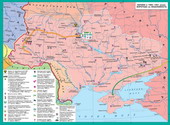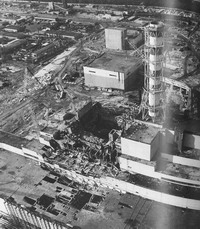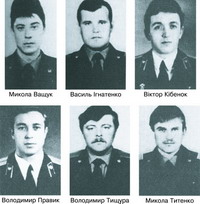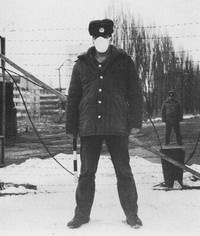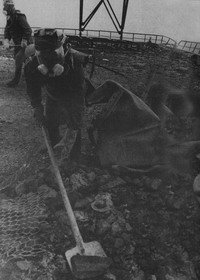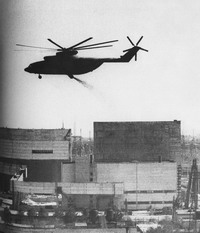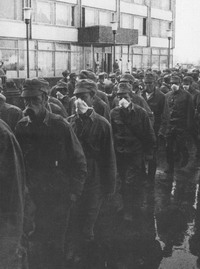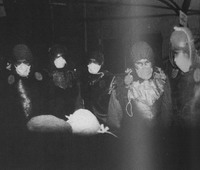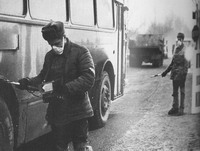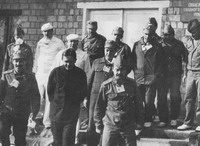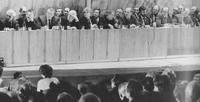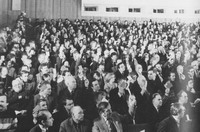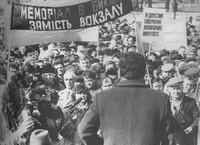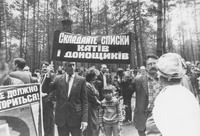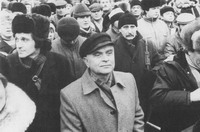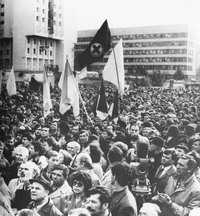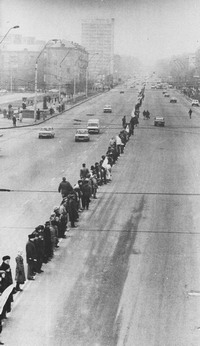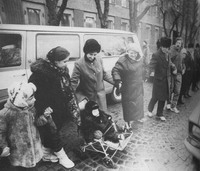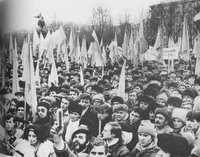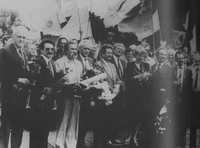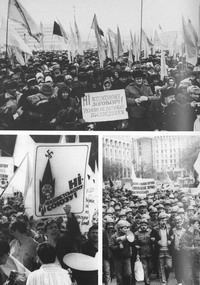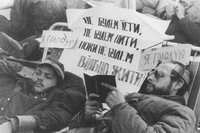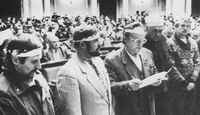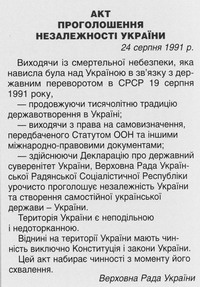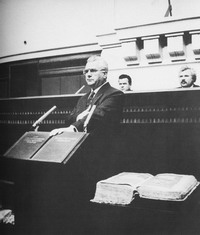Ukraine in 1985 -1991 he was the struggle for independence
Chernobyl disaster that happened on the night of 25 on April 26, 1986 on the effects of pollution has become a truly global scale catastrophe.
 Especially tragic are the implications for Europe. Around Chernobyl was formed 30-kilometer evacuation zone population. In Ukraine, according to official data, consider the contaminated area 16 regions, and in fact - all regions of the republic, including Kyiv were more or less harmful effects of radiation. At the disaster only in 1988 - 1990 рр. spent in prices of those over 20 billion rubles. In general, the needs of the accident is spent annually to 7% of the State Budget of Ukraine.
Especially tragic are the implications for Europe. Around Chernobyl was formed 30-kilometer evacuation zone population. In Ukraine, according to official data, consider the contaminated area 16 regions, and in fact - all regions of the republic, including Kyiv were more or less harmful effects of radiation. At the disaster only in 1988 - 1990 рр. spent in prices of those over 20 billion rubles. In general, the needs of the accident is spent annually to 7% of the State Budget of Ukraine.
Radioactive pollution caused by the disaster, is causing cancer among people, especially children of preschool and school age, it is harmful impact on the overall health of the population.

Restructuring and Ukraine
K. After the death of Chernenko in March 1985 as Secretary General of the CPSU Central Committee was elected Gorbachev. It was by his initiative in April 1985 began restructuring in the USSR. Surgery had to cover five major areas of society: the economy (transition from extensive to intensive management practices), domestic politics (democratization of public life and democracy), foreign policy (termination of the Cold War and building a common European house) social services ( improve material and cultural welfare) ideology (the elimination of censorship, openness, free expression of opinions of citizens). Theoretically the idea of restructuring had a chance to implement, but as life has shown, besides the general declarations, Gorbachev has failed for six-year period to put forward any practical conception of reforming Soviet society.
Rebuilding quickly stalled, exacerbated the socio-political, economic and national crisis and the collapse of the Soviet Union ended. Ukraine caucus in words unequivocally supported the actions of the Kremlin leadership is actually a time blocked the restructuring processes in Ukraine.
Perestroika had four stages. In March 1985 - January 1987 - reconstruction is carried out under the slogan "more socialism." Between 1987 and 1988 - the main idea - "more democracy", and 1989 - 1990 were characterized by separation and division in the camp leaders of perestroika, which led in 1991 to win radical reformism and the collapse of the USSR.
the restructuring processes in Ukraine controlled totalitarian state administrative nomenclature. During 1985 - 1987 Famine in Ukraine there were no political forces in the form of NGOs and people's fronts, similar to those encountered in the Baltic States and Russia. The passivity of the masses has its explanation. Against the background of a general, primarily economic, the collapse of the situation in Ukraine has remained relatively stable.
was another important subjective factor. Publicity in the national republics began to criticize party leaders first and nomenclature of different classes. V. Shcherbytsky that seventeen years led the Communist Party of Ukraine remained orthodox Communist and become one of the opponents of Gorbachev. Press Ukraine was called the Reserve stagnation.
Chernobyl disaster (April 1986) helped revive the social and political movement in the republic. November 13, 1988 in Kiev, the first years of Soviet power by massive environmental rally (20 thousand participants). Besides environmental issues, have been subjected to sharp criticism of officials guilty of the Chernobyl disaster and its aftermath.
1989 Ukraine wave of mining strikes that close to the sharp economic requirements and political issues raised - giving confidence in the nomenclature and bureaucrats-bureaucrats.
In a sharp escalation of social and economic crisis, rising prices and the relentless deterioration of living standards in the spring of 1990 were held the first democratic parliamentary elections, which reinforced the separation of political forces.
In September 1989 there was a mass political organization - Movement (People's Movement of Ukraine for Perestroika). One by one created by political parties in Ukraine (Ukrainian Republican Party, Democratic Party of Ukraine, "Green Party", Party of Democratic Revival of Ukraine, etc.).. July 16, 1990 the USSR Supreme Council adopted the Declaration on State Sovereignty of Ukraine, which became a harbinger of our country's independence.

«Publicity. Back in late 1980 - early 1990s he was the people the truth about the past of Ukraine
In the mid 1880's in the Soviet Union launched "perestroika". Restructuring initiative belonged to a small group of senior Communist party figures, who united around the new Central Committee Secretary Gorbachev. Today, when Gorbachev's political career was over, we can conclude that the reformers from the beginning, not his task to put the destruction of the totalitarian regime. Conceived reforms were not clearly defined. They spoke about the "acceleration", "update", a return to "Leninist principles," the new face of socialism ", etc.
Rebuilding began with information. It appeared purely Soviet term "publicity", which entered the foreign language without translation. In the transition from totalitarianism to democracy, transparency means a kind of transitional stage between the long period of quiet of mind to freedom of speech. Publicity - the right to know what happens in the country and the world.
In the second half of 1980 - early 1990's in the state where all the information structure was under stringent control, such an interim step towards freedom of speech, as publicity was particularly necessary. Thanks to the publicity people overcome stereotypes and dogmas of the old thinking, got to really evaluate the situation, using objective information, make your own conclusions. Society is rapidly polityzuvalosya.
pioneering role in the protection of Ukrainian culture, the environment, "white spots" of history played a Writers' Union of Ukraine and its central body - the newspaper "Literary Ukraine". Wide publicity had performances Gonchara Bratunya R., I. Dziuba, Ivan Drach, V. Drozd and many others. In Ukraine, began to return works of Vynnychenka Petliura, representatives Executed Renaissance, including M. Wave, M. Kulish, M. Zerov, historical works Hrushevsky M. Kostomarov prohibited works of Dzuba Internationalism whether Russification? "Braichevsky" Annexation or reunion?, repressed during the "stagnation" Vasyl Stus, E. Sverstiuk, I. and I. Kalynets. Ukraine to return from exile writer and one of the founders of the Ukrainian Helsinki Group (UHG) M. Rudenko.
in the republic began to spread "samvydavski" newspapers and magazines. Some of them were prepared outside of Ukraine and reflected the union problems, others were prepared in the republic. Yet in 1987 Mr. Chornovil resumed publication "Ukrainian Herald».
gradually become revealed the truth about these pages in Ukrainian history of the twentieth century. as the Central Council, the famine of 1921 - 1922, Famine of 1932 - 1933, forced collectivization, Stalin's repressions, OUN - UPA other tragic history of the Ukrainian people, launched a discussion about national symbols.
growing interest in the historical past of the Ukrainian people showed up to actively participate in celebrating the anniversary of mass events, which previously avoided writing official historiography or are covered biased. The most publicized policy response came in. In June and July 1988, there have been several unauthorized and unprecedented in scale rallies, which was led by former dissidents V. Chornovil Horyn brothers, Igor and Irina Kalynets. At these meetings openly talked about the many oppressions affecting Ukrainian.
In June 1986, Ukrainian writers, including O. Gonchar, D. Pavlychko, I. Drach, opposed the exclusion of use in the schools of the republic Ukrainian. According to Education Minister V. Fomenko, in Ukraine in 1987 in Russian language schools enrolled more than half of all students, and in Kiev with 300 thousand students studying in Ukrainian only 70 thousand However, these statistics are worrying of those party functionaries. The party apparatus of Ukraine did not hurry to change national policy.

in February 1989 were based Ukrainian Language Fellowship. Shevchenko, who acted outside party control, "Society of the Lion", "Green Light».
Quick politicization of society was manifested in meetings and demonstrations, most popular among them was the human chain of January 21, 1990 to celebrate the anniversary of the Unification Act and the UPR ZUNR.

Under the pressure of democratic forces of the USSR Supreme Council in 1989 adopted the Law on the language in which Ukrainian language became a state. Citizens of Ukraine provided the legal guarantee of free use of Russian language and languages of other nationalities living in the republic.
In early August 1990 in Dnipropetrovsk and Zaporizhia regions as a nationwide celebration of Cossack glory days were devoted to 500 anniversary of the Ukrainian Cossacks.
Transparency, liberalization, return to the people the truth about his past undermined the Soviet ideological stamps, accelerated the process of achieving genuine sovereignty of Ukraine.
increase the political activity of Ukrainian society
in the second half of 1980 new associations
the early 1980's society more and deeper vtyahuvalosya in total socio-economic, political and ideological crisis and the "masses' discontent grew in intensity, disbelief and indifference. In the "top" shaped reformist forces that have united around a new Central Committee General Secretary Gorbachev, elected to this position in March 1985
In 1986, XXVII Party Congress defined the rate of "acceleration" - bridging the gap between the USSR from advanced countries. At the January plenum of the CPSU Central Committee in 1987 Gorbachev declared course of reconstruction, ie, improvement, upgrading of the Soviet system, and transparency. Ukraine was among the last who indulge in these processes.
Since economic reform nashtovhnulosya of resistance inside of the CPSU, Gorbachev took a course on liberalization of the regime. He tried using the "transparency", "socialist pluralism" under the slogan of "restructuring" the Stalinist model of socialism and a return to "Leninist principles" and activate the masses by controlling this activity again, loosen the reactionaries.
In Ukraine, the political situation changed very slowly as the republic's leaders held a conservative position. In the first years of perestroika glasnost, declared in Moscow, had changed the face of the Republican press.
in a liberalized environment in Ukraine there are groups of the Greens, political clubs, educational organizations ukrainovedcheskie (Lion Society "1987 Club Heritage 1988 and the student union" Community ") . Their work goes beyond just a purely educational nature and becomes politicized. In autumn 1987 in Kiev appeared Ukrainian Cultural Club (UKK). In an attempt to hold a demonstration in 1988 before the second anniversary of the Chernobyl catastrophe UKK several leaders were arrested. At the end of 1987 out of prison and returned to Ukraine-known human rights activists, including Mr. Chornovil and M. Gorin, in January 1989 - L. Lukyanenko. In 1988, the official celebration of 1000 anniversary of the introduction of Christianity in Russia was used by dissidents in Ukraine to draw attention to the fate UAPTS Catholic parishes.
big influence on the situation in Ukraine was in the USSR of the popular movements, primarily in the Baltic republics. July 7, 1988 the Ukrainian Helsinki Union, based on the restored UGG, issued the Declaration of Principles for a number of provisions was close to the principles for the popular movements Baltic republics: transform the USSR into a confederation of independent states, state Ukrainian language release of all political prisoners, etc. .
in September 1989 on the initiative of the Union of Writers of Ukraine, supported by historical and educational society "Memorial" (inaugural conference - May 1989) and the Ukrainian Language Fellowship. Shevchenko (inaugural conference - February 1989), a mass political organization - Movement (People's Movement of Ukraine for Perestroika).

baptism of fire for new activists, NGOs have become Soviet parliamentary elections in spring 1989 as the first time in many decades in the Soviet electoral system to one place claimed several candidates, and even nominated, "bottom" . Despite antydemokratyzm the election law, managed to hold the number of deputies from the opposition. Lviv looked yellow and blue flags were heard calling for a strike.
summer 1989 miners' strike has captured the most important mining regions of the USSR, including the Donbass (striking 250 thousand people) and the Lviv-Volyn basin. Although they then put forward mainly economic demands, but the Communist Party could not have put himself defender of the interests of the working class.
autumn of 1989 failed to make substantial amendments to the draft law on elections to the Supreme Soviet, in particular, was shot representation from NGOs. Then Parliament passed the law on languages, by which it proclaimed Ukrainian state.
In 1989 - 1990 multi-sprouts appear. Activation of political life led to rapid population growth of national consciousness. From 1990 began the movement for withdrawal from the USSR. July 16, 1990 the USSR Supreme Council adopted the Declaration on State Sovereignty of Ukraine, which declared the rule, independence, fullness and indivisibility of the republic authorities within its territory, independence and equality in foreign relations.

Declaration on State Sovereignty of Ukraine and its historical value
In the Supreme Soviet deputies calling XII (1990 - 1994) an absolute majority of deputies (239 persons) were members of the Communist Party. However, the idea of national revival independence declared itself increasingly insistent mouth and minority - of the national-democratic deputies. Party-state leadership of the republic could not withstand this sentiment and took a step, which contradicted the policy center.
Adopted July 16, 1990 Declaration on State Sovereignty of Ukraine declared the people of Ukraine will decide their fate.
independence of Ukraine
In 1989-1990 in the USSR along with the socio-economic problems faced sharp questions about changing the political system of the country. March 17, 1991-Union held a referendum on preserving the Soviet Union. In Ukraine, during the referendum this Parliament invited the residents of the republic additional question: "Do you agree that Ukraine should be a part of the Soviet Union of sovereign states on the principles of the Declaration on State Sovereignty of Ukraine?»
people of Ukraine responded positively as the major (70,2% of those who took part in the voting) and the additional questions (80,2%). Despite the contradictory results of the referendum and polls, it was evident that public opinion in Ukraine is inclined toward independence.

After the referendum began the so-called "Novooharovskyy process" - talks the leaders of nine republics, including Ukraine, with Soviet President Mikhail Gorbachev in a new union contract. Advance signing planned for August 20, 1991 This was the last attempt of Gorbachev to save the integrity of the Soviet state by a compromise between the republics and the center. In this process interfered with the conservative forces that sought to not only maintain a single united state, but also to prevent its renewal in any form.
August 19, 1991 reactionaries attempted coup. Blocking Gorbachev at the dacha in Foros, next co-president of the Soviet Union announced the establishment of the State Committee on state of emergency (DKNS, Russian HKCHP .-), which included eight persons. They include Vice President of the USSR G. Yanayev, Prime Minister Pavlov, head of the KGB Mr. Kryuchkov, Defense Minister D. muscular, Interior Minister Boris Puho.
They declared their intention to restore order in the country and prevent the collapse of the USSR. Pryzupynyalasya political parties, public organizations and mass movements. It was forbidden to conduct rallies, demonstrations and strikes. Installed control over the media. In some regions of the Soviet Union for six months zaprovadzhuvavsya emergency.
But rebels immediately faced with a resolute opposition to the RSFSR leadership, headed by Russian President Boris Yeltsin. In defense of democracy by the tens of thousands of residents of Moscow and other cities in the USSR. Among the defenders of the White House in Moscow were representatives of Ukraine under the blue and yellow flags. Yeltsin's actions were supported by most governments around the world. Mutiny failed.
Mutiny highlighted real, not declarative positions and intentions of all political parties and state bodies in Ukraine. Guide CC CPU found itself on the side of rebels. Secretariat of the Central Committee sent to the field shyfrohramu where approved by the revolution and to organize support for party committees proposed action DKNS.
sent by Ukraine to the general Varennykov said that if nepidtrymky DKNS decisions, holding strikes and disobedience actions will take effect in the war. Leonid Kravchuk, and led by the Verkhovna Rada of Ukraine (where the majority of the Communist Party) called for peace and endurance. But while Leonid Kravchuk said that any change must be based on law and reason for entering the republic a state of emergency there.
consistently and strongly opposed the rebels only in Ukraine, representatives of the opposition Movement and newly democratic parties. They made a proposal to condemn the insurgency special decision of the Supreme Soviet of the USSR. When blocking the Presidium of the Supreme Council attempts to give the proper assessment DKNS action, the Democrats have launched an extensive work among the masses. Began preparing to strike.
August 24, 1991 the Verkhovna Rada of the Ukrainian SSR adopted a historic document - the Declaration of Independence of Ukraine, which, inter alia, stressed: "The Verkhovna Rada of the Ukrainian Soviet Socialist Republic solemnly proclaims the independence of Ukraine and the creation of an independent Ukrainian state - Ukraine. The territory of Ukraine is indivisible and inviolable. From now on the territory of Ukraine are only valid Constitution and laws of Ukraine.

thereby put an end to the legal existence of the USSR. In the political world map, a new sovereign state - Ukraine.
Declaration of Independence of Ukraine, which was the date of adoption of the national holiday of the state, was not a random phenomenon. The quest for national sovereignty has been tested for centuries. The right to self-determination - the right people to determine their own destiny.
Thus, the Declaration of Independence of Ukraine - a great document of historic importance, which is restoring historical justice, a natural consequence of development of the Ukrainian people.
Under current laws at that time, the question of the people of Ukraine's right to self-determination is not outside the competence of the Supreme Soviet and was settled by a nationwide referendum. Therefore, the same day the resolution was adopted and the Supreme Soviet USSR "On the independence of Ukraine, which to be held December 1, 1991 national referendum to confirm the Act of Independence of Ukraine.
referendum held at the scheduled time, 90.32% of people who participated in the referendum question on the ballot for confirmation Act responded: "Yes to confirm. The positive response has given people of all regions of Ukraine and Crimea, regardless of their national structure. Results of the referendum showed the desire of the people be the rightful owner to own land, not "younger brother", a part of another empire with a new facade. Results of voting marked the full entry of Ukraine into the world community of free nations. There was a wave of diplomatic recognition of Ukraine as an independent state.
December 1, 1991 Ukraine has elected its first president of an independent state.
The election ballot in the presidential election in Ukraine was included six candidates - B. Grineva, Leonid Kravchuk, L. Lukyanenko, L. Taburyanskoho, DESOMARK I. Yukhnovsky. Candidate for President of Ukraine Oleksandr Tkachenko on the last stage of struggle, withdrew his candidacy and urged voters to vote for Kravchuk. The opposition failed to put a single candidate: Movement nominated head of the Lviv Regional Council Chornovil, but its leaders I. Drach and M. Gorin, like the Ukrainian Republican Party, campaigned for a head PSA L. Lukyanenko, Party of Democratic Revival of Ukraine (PDVU ) - for the head of the People's Council in the parliament of Ukraine academician I. Yukhnovsky and one of the leaders PDVU, MP V. Grineva.
Already in the first round, gaining 61.6% of the vote won Verkhovna Rada of Ukraine in the recent past Ideology Department head of the Communist Party Central Committee, secretary of the Communist Party Central Committee Leonid Kravchuk. He became the first president of independent Ukraine.

 English
English
